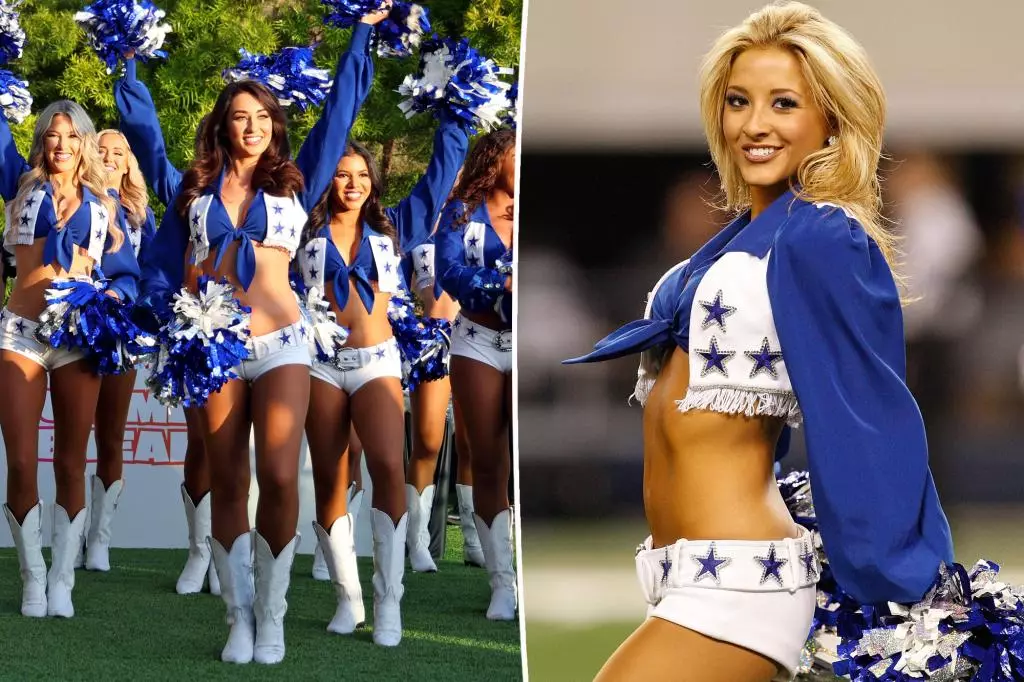The Dallas Cowboys Cheerleaders, a group synonymous with cheerleading excellence, resilience, and iconic status in sports culture, have recently emerged from the shadows of financial disenfranchisement. Their journey towards achieving a livable wage has been unveiled in the second season of their Netflix series, “America’s Sweethearts: Dallas Cowboys Cheerleaders.” Acknowledging the grit and determination displayed by these talented women, their fight is not merely about an increase in pay but represents a significant broader movement advocating for fair compensation in professions dominated by traditional practices and gender norms.
Historically, cheerleaders have been tragically undervalued, often receiving salaries that are laughable considering the immense commitment and skill required to execute their roles. Jada McLean, a five-year veteran, poignantly expressed the struggle, revealing that she previously earned a mere $15 per hour and $500 per game appearance. This sensational pay enhancement, set to take effect in the 2025 NFL season, amounts to a staggering 400 percent increase, allowing seasoned team members the potential to earn up to $75 per hour. However, it’s pertinent to note that many cheerleaders still endure harsh realities, like the absence of health benefits—an aspect that exposes the precarious conditions in which these women operate.
The Weight of Financial Strain
The cheery facade that sports icons like the Dallas Cowboys Cheerleaders project often masks significant financial struggles behind the glittering uniforms. In the earlier phases of her career, McLean confessed to the tough decision of taking on side jobs to make ends meet, a reality echoed by her teammates. “Yes, we should still do something outside of just cheering,” she stated, a sentiment that resonates with countless individuals in similarly underappreciated roles. This call for fair compensation underscores a critical aspect: the need for dignity and livability in work associated with passion and talent.
Interestingly, this battle wasn’t limited to discussions at the negotiation table. The group contemplated striking—a powerful move that highlights just how serious their demands became. “We pushed and we got back good results,” proclaimed teammate Armani Latimer, showcasing a sense of collective empowerment that extended beyond mere financial gain. Such resistance not only aids current performers but also lays down a robust foundation for future cheerleaders, further solidifying a cultural shift.
Historical Context: The Long Road to Recognition
The journey toward equitable compensation has not been an easy one. Back in 2017, reports indicated cheerleaders were earning as little as $75 to $150 per game, excluding payment for practices. This was met with outrage, leading to increasing awareness of the economic inequities many faced. Erica Wilkins, a retired cheerleader, notably filed a lawsuit in 2018 against the Dallas Cowboys, revealing her shocking wage of just $7 per hour—a harrowing illustration of the cheerleaders’ financial plight.
Over the years, social media has played a critical role in amplifying these voices and exposing the harsh realities behind the bright lights of NFL games. Former cheerleader Kristin Westbrook’s Instagram posts revealing her own compensation struggles further illustrate a collective narrative that can no longer be ignored. The calculated dissemination of these revelations highlights the necessity of solidarity and the undeniable potential of digital platforms in advocating for prevalent change.
A Cultural Shift in the Making
As the cheerleaders’ plight gains traction through public discourse, the societal acknowledgment of their contributions is shifting positively. “America’s Sweethearts” captures the raw emotions and dedication these women exhibit both on and off the field. The spotlight rightly shines on their physical abilities, but it also emphasizes the underlying injustice they endured for years. Their story is inspiring a dialogue not just in the world of cheerleading but across various professions where individuals face compensation disparities based on gender and societal expectations.
The Dallas Cowboys Cheerleaders are no longer simply a symbol of spirited entertainment; they embody empowerment and change. Their relentless pursuit of fair wages is more than a personal victory— it represents the reclamation of dignity and respect within a realm often overlooked. As they stand on the cusp of change, one can only hope this paradigm shift in compensation extends far beyond the sidelines, paving the way for future generations of women in the profession to thrive under conditions reflective of their talent and hard work.

